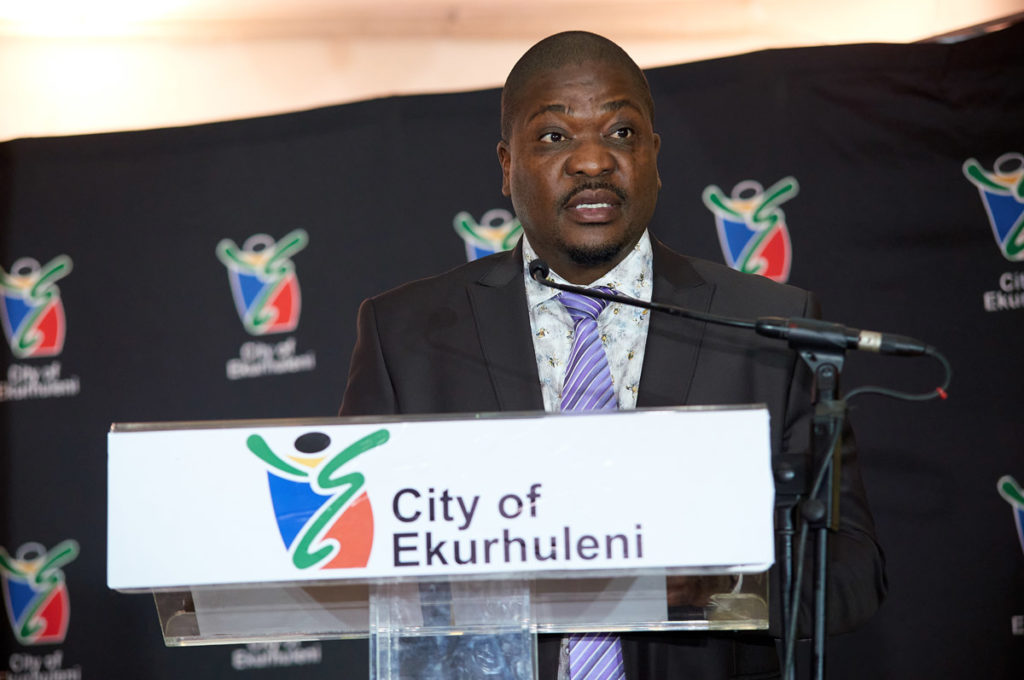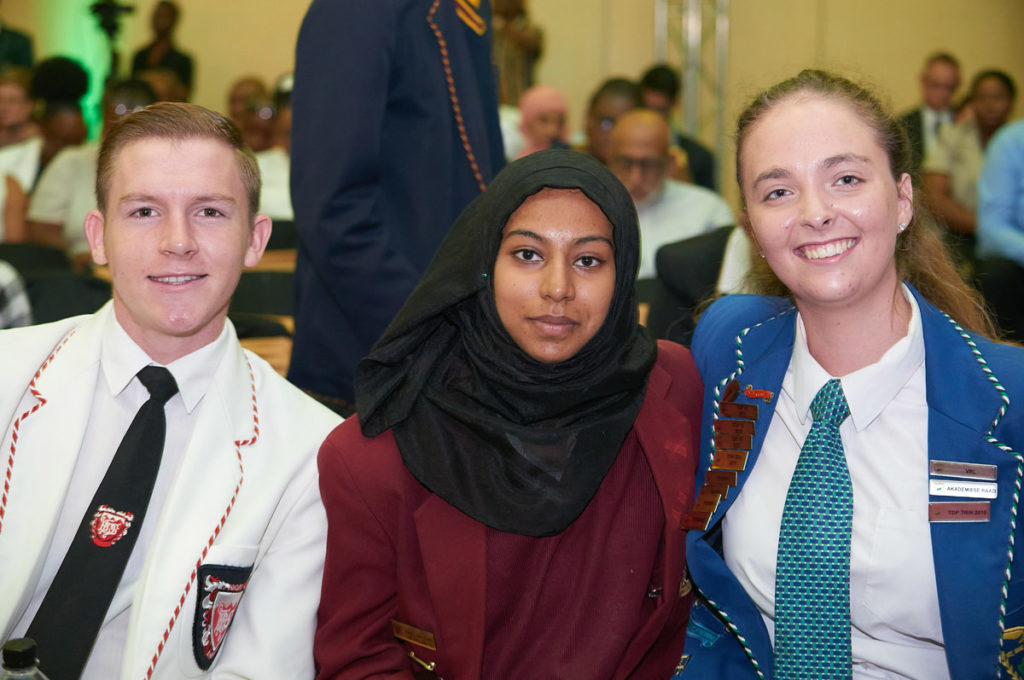Ntuthuko Hlatshwayo was one of Ekurhuleni's top achievers
The city of Ekuruhleni has prioritised education as key to the future development of all communities and people living in the metro.
Executive mayor Mzwandile Masina noted in the programme foreword to the excellence awards: “There are fewer pleasures in the life of a public servant greater than the honour of being part of shaping the future for the better.”
Although education is not a primary function of local or municipal government, Masina said the metro considered it a moral obligation to support national education priorities. “This includes attempts to redress the past socioeconomic and spatial inequalities birthed in apartheid,” he said.
 Ekurhuleni Mayor Mzwandile Masina talks at the academic excellence awards
Ekurhuleni Mayor Mzwandile Masina talks at the academic excellence awards
The metro supports the Gauteng department of education’s initiative for schools of specialisation to raise education outcomes and respond to the current skills shortage.
The city’s investment extends to tertiary education. To advance its skills development project it has increased the education allocation to R100-million for the Community Bursary Fund, a 10-fold increase from previous years when the bursary fund was at R10-million, according to Masina. The number of beneficiaries has increased from just under 300 to nearly 2 000.
Mpendulo Guca attended Etwatwa High School and is a bursary beneficiary, as he comes from a disadvantaged background. He studied for a BSc at the University of Johannesburg and is proud of his achievement as the first generation in his family to access tertiary education.
“First year was difficult, eish,” he said. Although he achieved good marks, he says there were always “people better than me”. He said he got through, as he combined “a bit of smarts and a bit of hard work”. He now has a Miway Insurance internship.
Nontsikelelo Langa graduated with a degree in health sciences from the University of Witwatersrand. She said it was “amazing” to have the bursary support, as she moved to Ekurhuleni from KwaZulu-Natal and had a baby while she was studying.
Lisa Nunes is another high achiever who benefitted from a full bursary. Now working as a young doctor, she said: “I give everything I can and do my best”. Speaking as part of a panel, she said she believes a focus on youth will benefit the country across all sectors, not only health.
Masina reflected on South Africa’s history. “The African National Congress inherited a country that was torn apart by a history of injustice. Forty-eight years of the brutal apartheid regime preceded by nearly three centuries of colonial devastation left our country bleeding and our people deeply divided. The legacy of separate development, which continues to find expression today, meant that at the dawn of democracy, ours was a country of two nations,” he said.
He then quoted former president Thabo Mbeki: “One of the nations is white, relatively prosperous regardless of gender or geographic dispersal — it has ready access to a developed economy, physical, educational communication and other infrastructure. But the second and larger nation of South Africa is black and poor… And this nation lives under conditions of a grossly underdeveloped economic, physical, educational, communication and other infrastructure — it has virtually no possibility to exercise its theoretical right to equal opportunity, with that right being equal within this black nation only to the extent that it is equally incapable of realisation.”
The executive mayor went on to say: “This nation of poor black people living under conditions of underdeveloped infrastructure, is a nation which our democratic government has not only sought to uplift, but one which it has sought to integrate into an economy, education and infrastructure that is decent and humane.”
“In Gauteng,” Masina said, “we have witnessed extraordinary changes in our education. Over the past few years, we have seen our townships transform from neglected spaces into sites of world-class learning institutions — institutions that are not only superior in terms of their infrastructure and use of advanced technologies, but also in terms of the quality of educators our children are being nurtured by.”
The Gauteng department of education and youth development has established several schools of specialisation that are aimed at harnessing the talents of children and responding to the skills shortage that the country is facing. For this reason, some of these specialisation schools target people with disabilities, such as the KwaThema Skills School of Specialisation, established in Ekurhuleni.
 Michael Ivan Baxter, Attiyah Naidoo and Ulrika Amor Smith
Michael Ivan Baxter, Attiyah Naidoo and Ulrika Amor Smith
Masina said government has embarked on a comprehensive nutrition programme in the lower quantile and no-fee schools, to ensure that learners are guaranteed a warm meal at least once a day, alleviating the scourge of hunger. Coupled with the city’s provision of a social package to indigent households, which includes free basic water, electricity, refuse removal and in some cases monthly groceries, he said no child in this city and in this province would go hungry.
Masina further highlighted that the city’s Back to School Programme has been instrumental in ensuring that learners receive the support and motivation that they need to excel. Some of the schools that are part of this campaign have produced exceptional results. Several top learners have emerged from the priority schools that we identified, Masina said. These include Mfundo Hlatswayo from Alafang Secondary School in Katlehong and Mathapelo Thlokomelo Morobi from Phumlani Secondary School, also in Katlehong.
Kgotlelelo Salome Matlou and Philani Tshabalala were part of the Back to School Programme and are the best-performing learners in their subjects, which demonstrates that public schools in our townships, with the right amount of support and investment, can manufacture academic excellence.
Tembisa Secondary School and Tsakane Secondary School are also among the most improved schools, with their pass rates and quality of passes improving significantly since the intervention of the programme.
Matriculants
The pass rate in Gauteng matric stands at 87.23%, the second highest in the country, said Masina. He also highlighted that the province has played a significant role in reducing the gap between township pass rates (89.82%) and non-township schools (92.61%).
Another notable achievement is that Ekurhuleni North District has maintaied its position in the Top 10 best performing districts nationally, with a pass rate of 88.79%.
The best performing learner overall is Ulrika Amor Smith from Hoerskool Jeugland in Ekurhuleni North district. She said she was “really shocked” when she heard her results and that her teachers motivated her. She plans to study a BSC at the University of Pretoria.
Attiyah Naidoo from Liverpool Secondary in Ekurhuleni North placed second as best overall performer. She achieved eight distinctions because she wanted to “satisfy myself, personally”. She plans to become a doctor, studying at Wits.
Michael Ivan Baxter from Bracken High in Ekurhuleni South was third overall best performing learner. His district is most improved, from 86.5% in 2018 to 87.4% in 2019. Ntuthuko Hlatshwayo, also from Ekurhuleni South, Germiston High, was one of the top three best performing learners.
Masina also announced plans to change the name of the academic excellence awards to honour Godfrey Mokgonane Pitje. Pitje came from Daveyton and had a long history of struggle in the African National Congress in the education arena.
He reminded learners that they are going to university “not only for you, but for your family and community”.